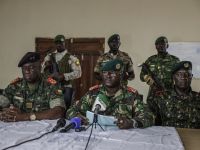U.S. Vice President Dick Cheney said Monday that inaction regarding Iraq "could have devastating consequences for many countries, including our own." Answering critics of the administration's campaign to topple Saddam, Cheney said, "What we must not do in the face of a mortal threat is to give in to wishful thinking or willful blindness."
"This nation will not live at the mercy of terrorists or terror regimes," Cheney said.
Cheney noted he recognized that many, including some prominent Republicans, were urging caution in confronting Saddam at this time. But he said they were displaying "deeply flawed" logic. "We will not simply look away, hope for the best and leave the matter for some future administration to resolve," he said.
White House lawyers have told President Bush he would not need congressional approval to attack Iraq, sources said Sunday night.
According to AP, two senior administration officials said White House counsel Al Gonzales advised Bush earlier this month that the Constitution gives the president authority to wage war without explicit authority from Congress.
"Any decision the president may make on a hypothetical congressional vote will be guided by more than one factor," said White House spokesman Ari Fleischer. "The president will consider a variety of legal, policy and historical issues if a vote were to become a relevant matter. He intends to consult with Congress because Congress has an important role to play."
Despite the go-ahead from his legal advisers, administration officials said Bush has not ruled out seeking lawmakers' approval if he decides to attack Iraq.
One of the officials said Gonzales also concluded Bush has authority to act against Saddam under the congressional resolution that authorized his father's actions in the 1991 Gulf War. Furthermore, that official said Bush was told he also could act against Iraq on the strength of the Sept. 14 congressional resolution approving military action against terrorism. (Albawaba.com)
© 2002 Al Bawaba (www.albawaba.com)







